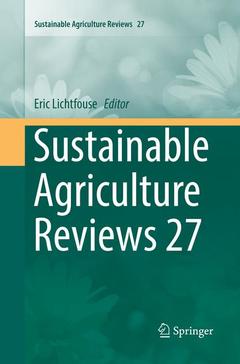Description
Sustainable Agriculture Reviews 27, Softcover reprint of the original 1st ed. 2018
Sustainable Agriculture Reviews Series, Vol. 27
Coordinator: Lichtfouse Eric
Language: English
Subjects for Sustainable Agriculture Reviews 27:
Publication date: 01-2019
Support: Print on demand
Publication date: 05-2018
Support: Print on demand
Description
/li>Contents
/li>Biography
/li>Comment
/li>
This book deals with a rapidly growing field aiming at producing food and energy in a sustainable way for humans and their children. It is a discipline that addresses current issues: climate change, increasing food and fuel prices, poor-nation starvation, rich-nation obesity, water pollution, soil erosion, fertility loss, pest control and biodiversity depletion. This series gathers review articles that analyze current agricultural issues and knowledge, then proposes alternative solutions.
Chapter 01: Water quality impacts on agricultural productivity and environment; Alfred O.M. Okorogbona, Freddie D.N. Denner, Lavhelesani R. Managa, Tsunduka B. Khosa, Khathutshelo Maduwa, Patrick O. Adebola, Stephen O. Amoo, Hanyeleni M. Ngobeni, Stanford Macevele
Chapter 02: Agro-ecosystem diversity in petroleum and natural gas explored sites in Assam State, North-Eastern India: socio-economic perspectives; Dolikajyoti Sharma, Hemen Sarma, Sujata Hazarika, N F Islam, M N V Prasad
Chapter 03: Pest management in stored products: the case of the cigarette beetle, Lasioderma serricorne (Coleoptera: Anobiidae); Ana Paula Oliveira da Silva, Antônio Euzébio Goulart, Santana Joeferson Reis Martins, Henrique Fonseca Goulart, Alessandro Riffel1,, Janeílda Costa Vaz
Chapter 04: Floriculture Sustainability Initiative: The Dawn of New Era; Muneeb Ahmad Wani, Imtiyaz Tahir Nazki, Ambreena Din, Shameen Iqbal, Sartaj A. Wani, Aijaz Ahmad Sheikh, Tariq Ahmad Bhat
Chapter 05: Ozone toxicity and remediation in crop plants; Annesha Ghosh, Aditya Abha Singh, Madhoolika Agrawal, S.B. Agrawal
Chapter 06: Amaranth and millet in the context of “silent hunger” and food distribution; Aleksandra Badora, Małgorzata KochanChapter 07: Impact of Cyclodextrin in Drug Delivery System: Current Status and Future Perspective; Somesh Mohapatraa, Oshin Saprab, Shweta Parohac, Ravindra Dhar Dubeyd Chapter 08: Sustainable agriculture in the Republic of Korea; Jungho Suh
Chapter 09: Crop productivity in changing climate; Bhupinder Dhir
Chapter 10: In vitro propagation of ornamentals for Maximising livelihood security; Imtiyaz T. Nazki, Madinat-Ul-Nisa, Divya Slathia, Muneeb Ahmad Wani1, Ambreena Din
The book (and series) is a state of the art on the latest research in sustainable agriculture
This book series gathers review articles that analyze current agricultural issues and knowledge, then propose alternative solutions
This book (and series) covers multidisciplinary topics and therefore help all scientists, decision-makers, professors, farmers and politicians who wish to build a safe agriculture, energy and food system for future generations
These books may interest you

Sustainable Agriculture Reviews 158.24 €



